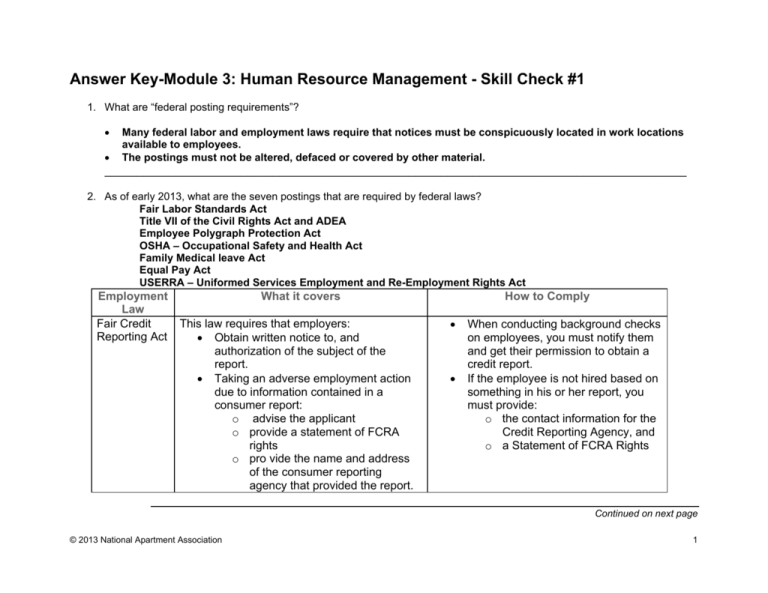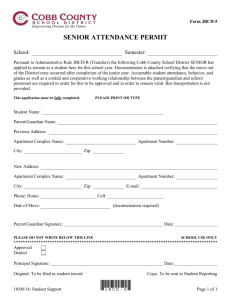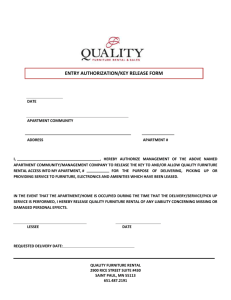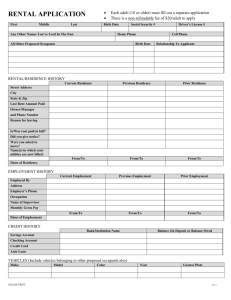Answer Key-Module 3: Human Resource Management
advertisement

Answer Key-Module 3: Human Resource Management - Skill Check #1 1. What are “federal posting requirements”? • • Many federal labor and employment laws require that notices must be conspicuously located in work locations available to employees. The postings must not be altered, defaced or covered by other material. __________________________________________________________________________________________ 2. As of early 2013, what are the seven postings that are required by federal laws? Fair Labor Standards Act Title VII of the Civil Rights Act and ADEA Employee Polygraph Protection Act OSHA – Occupational Safety and Health Act Family Medical leave Act Equal Pay Act USERRA – Uniformed Services Employment and Re-Employment Rights Act Employment Law Fair Credit Reporting Act What it covers This law requires that employers: • Obtain written notice to, and authorization of the subject of the report. • Taking an adverse employment action due to information contained in a consumer report: o advise the applicant o provide a statement of FCRA rights o pro vide the name and address of the consumer reporting agency that provided the report. How to Comply • • When conducting background checks on employees, you must notify them and get their permission to obtain a credit report. If the employee is not hired based on something in his or her report, you must provide: o the contact information for the Credit Reporting Agency, and o a Statement of FCRA Rights Continued on next page © 2013 National Apartment Association 1 Answer Key-Module 3: Human Resource Management - Skill Check #1, Continued 1., (continued) Employment Law Title VII of the Civil Rights Act of 1964, as Amended The Civil Rights Act of 1991 What it covers In all stages of the employment process, you may not discriminate because of: • Race • Color • Religion • Sex, or • National origin. Anyone suing for intentional discrimination can recover damages up to $300,000, based on size of employer • • • • • • • How to Comply In advertisements and job descriptions, avoid words suggesting preference to race, sex, religion or national origin. Advertise in publications with a large circulation. Make sure application complies with the law. Ensure uniform job interviews. Proceed cautiously with adverse employment actions Avoid situations where an applicant or employee can assert emotional distress or willful discrimination Ensure that tests are validated for neutrality and do not create an adverse impact for minorities or females. Continued on next page © 2013 National Apartment Association 2 Answer Key-Module 3: Human Resource Management - Skill Check #1, Continued Employment Law What it covers Fair Credit Reporting Act This law requires that employers: • Obtain written notice to, and authorization of the subject of the report. • Taking an adverse employment action due to information contained in a consumer report: o advise the applicant o provide a statement of FCRA rights o pro vide the name and address of the consumer reporting agency that provided the report. Age Discrimination in Prohibits employment Employment Act (ADEA) discrimination to applicants or employees who are 40 or older • • • • • • How to Comply When conducting background checks on employees, you must notify them and get their permission to obtain a credit report. If the employee is not hired based on something in his or her report, you must provide: o the contact information for the Credit Reporting Agency, and o a Statement of FCRA Rights Do not question applicants regarding age Do not advertise for a “recent college grad.” Consistently consider job performance in reviews and promotions Consider mature and experienced employees as valuable assets Continued on next page © 2013 National Apartment Association 3 Answer Key-Module 3: Human Resource Management - Skill Check #1, Continued Employment Law Title I of the Americans with Disabilities Act Fair Labor Standards Act (FLSA) What it covers Prohibits employment discrimination against disabled applicants or employees who can perform the essential functions of the job, with or without reasonable accommodation • • Sets requirements for minimum wage and overtime eligibility Regulates child labor How to Comply • Make hiring decisions based on ability to do the job • Make sure job descriptions focus on essential functions • Avoid questions that focus on possible disabilities • Defer medical exams/inquires until after conditional job offer has been made • Exclusionary criteria must be “job related and consistent with business necessity” • Make reasonable accommodations • If an applicant is not hired for safety reasons, you must demonstrate that the individual poses a “direct threat” to himself or others. Be aware of what employees are exempt from overtime pay. Continued on next page © 2013 National Apartment Association 4 Answer Key-Module 3: Human Resource Management - Skill Check #1, Continued Employment Law FLSA Overtime Rules What it covers As of August 2004: • Employees must be paid at least federal minimum wage • Employees must be paid 1.5 times their regular hourly rate for every hour over 40 in a work week • Does not apply to “Exempt” employees How to Comply Review position descriptions and compensation levels carefully to ensure that employees are properly classified and compensated. Equal Pay Act Requires employers to pay equal wages to male and female employees who perform similar work (equal skill, effort, responsibility) Make sure that you do not pay an individual more or less because of their gender. Continued on next page © 2013 National Apartment Association 5 Answer Key-Module 3: Human Resource Management - Skill Check #1, Continued Employment Law Occupational Safety and Health Act (OSHA) • • • • What it covers Requires employers to have a safety program to protect employees from hazards Requires information to be accessible to employees about hazardous materials they may use Requires periodic safety training Requires documentation of workplace injuries • • • • • • • • • How to Comply Provide workplace that is free hazards of health and safety Comply with safety and health standards promulgated by OSHA If you have more than 11 employees, maintain a log and summary of all injuries and illnesses, as well as a record of the incident Provide periodic safety training Report job related injury or fatality of 5 or more employees to OSHA within 48 hours Conduct inspections of your facilities Maintain material safety data sheets Require that all employees read and understand safety policy and receive instruction on how to work safely Provide personal protective equipment and make sure it is used Continued on next page © 2013 National Apartment Association 6 Answer Key-Module 3: Human Resource Management - Skill Check #1, Continued Employment Law Employee Retirement Income Security Act (ERISA) What it covers Regulates employee pension and welfare benefit plans • • • • Immigration Reform and Control Act (IRCA) • • National Labor Relations Act (NLRA) • • • Prohibits employment discrimination based on national origin or citizenship status Requires the processing of an I-9 form to prevent the hiring of illegal aliens • Regulates the labor management relationship Prohibits discrimination based on union activity Applies to private sector employers that have an impact on interstate commerce • • • How to Comply Know the basics of you company retirement/pension plan Appoint a plan administrator Give employees a summary plan description within 90 days of employment Know who your plan administrator is Do not refuse to hire an individual because you believe they not have legal employment status. Let the verification process of the I-9 form determine eligibility Do not ask to see more or different documents than those required for completion of the I-9 Be familiar with the law and/or collective bargaining agreement specifics You are prohibited from interfering, restraining, or coercing employees in regard to union participation, membership or activities Continued on next page © 2013 National Apartment Association 7 Answer Key-Module 3: Human Resource Management - Skill Check #1, Continued Employment Law Uniformed Services Employment and Reemployment Rights Act of 1994 • • Jury Systems Improvement Act What it covers Prohibits employment discrimination because of an applicant’s or employee’s military obligations Requires employers to reinstate employees to their former jobs after honorably completing military duty Prohibits an employer from disciplining or terminating an employee for being called to serve on a federal jury • • • How to Comply You must allow a “uniformed services” employee an unpaid leave if called into duty When an employee is honorably discharged, reinstate them into their former position, and allow the time absent to accrue toward seniority, benefits and other provisions of employment You must grant unpaid leave to employees performing federal jury service and reinstate employees to their jobs when the service is over Continued on next page © 2013 National Apartment Association 8 Answer Key-Module 3: Human Resource Management - Skill Check #1, Continued Employment Law What it covers Fair Credit Reporting Act Requires that employers: • Obtain written notice to, and authorization of the subject of the report. • If taking an adverse employment action due to information contained in a consumer report: o advise the applicant o provide a statement of FCRA rights o provide the name/ address of the reporting agency Employment Polygraph Prohibits employers from requiring Protection Act applicants to submit to a polygraph exam • • • • How to Comply When conducting background checks on employees, you must notify them and get their permission to obtain a credit report. If the employee is not hired based on something in his or her report, you must provide: o the contact information for the Credit Reporting Agency, and o a Statement of FCRA Rights Do not use polygraphs as a means of pre-employment screening Evaluate whether the facts allow for a polygraph Continued on next page © 2013 National Apartment Association 9 Answer Key-Module 3: Human Resource Management - Skill Check #1, Continued Employment Law Family and Medical Leave Act (FMLA) Consolidated Omnibus Budget Reconciliation Act of 1986 (COBRA) What it covers • Requires employers to grant up to 12 weeks of unpaid leave during a 12-month period for: • Birth or adoption • Employee’s serious health condition • To care for a parent, spouse, or child with a serious health condition • Applies to employers with 50 or more employees at a worksite or at all sites within 75 mile radius Allows for the extension of group health insurance coverage to employees and/or dependents on a self-pay basis who would otherwise lose coverage • • • • • • • • How to Comply Ensure your company has a policy regarding this law and it stated requirements for the employer and employee Continue health insurance to employee with no extra charges Reinstate employee to the same position when they return to work Display the FMLA Leave Act of 1993 poster Provide written guidance to anyone that requests it Notify employee of their right to continue coverage within 14 days of employees separation date Require a return receipt for all notifications sent to employee Collect the ex-employee premium each month Continued on next page © 2013 National Apartment Association 10 Answer Key-Module 3: Human Resource Management - Skill Check #1, Continued Employment Law Health Insurance Portability and Accountability act of 1996 (HIPAA) • • Worker’s Compensation • • © 2013 National Apartment Association What it covers Provides standards for an employee’s new group health plan to limit or exclude pre-existing conditions Applies to all employers who provide health coverage Insurance system dealing with employee claims originating from workplace injury or illness State laws define benefits, compensable injuries, cash benefit levels, waiting periods, filing and contesting claims procedures • • How to Comply Employers medical insurance comply takes care of compliance Check with your state agencies responsible for workers compensation. 11 Certified Apartment Manager (CAM)SM Course 3: Human Resource Management Answer Key- Course 3: Human Resource Management - Skill Check #2 Instructions Read the questions below and complete the answers. This skill check covers information in Chapter 2 of the Human Resource Management Guide. You may use your book to complete this skill check. Once complete, your instructor will provide you with an answer key and you will grade yourself. 1. What components make up an employee’s total cash compensation? • • • • • 2. Salary Benefits Incentive/Variable Pay Recognition Reward Programs Describe how base salaries are determined. Base salaries determination can be made by: • Median salary • Salary ranges to take into account experience, property size, and performance. 3. What are the different components that may be included in a benefits package? • • • • • 4. Medical/dental/vision/prescription Retirement programs Employer contributions to Social Security and Unemployment Life Insurance Short and long term disability insurance What costs represent the largest share of the cost of employer-sponsored benefits packages? Medical benefits _____________________________________________________________ Continued on next page © 2013 National Apartment Association 1 Certified Apartment Manager (CAM)SM Course 3: Human Resource Management Answer Key- Course 3: Human Resource Management - Skill Check #2, Continued 5. List the ways leasing professionals, managers and maintenance personnel could earn incentive/variable pay. • • • • • • • • 6. Leasing commissions Concessions Flat rate compensation Lease renewal Team performance Individual performance Free or discounted housing Reward and recognition List the average salary or salary range for the positions below: Position Property Manager Assistant Apartment Manager Leasing Manager Leasing Consultant Maintenance Supervisor or Manager Maintenance Technician 7. Salary/Salary Range $82,000 - $106,000 $32,500 $37,800 $26,400 $35,600 - $46,200 depending on property size $27,600 Explain how employee records should be stored to maintain confidentiality. Employee files should be kept in a locked filing cabinet in all locations. 8. List the types of employees who should have access to employee records. • • HR employees with a business need to know The direct supervisor or departmental manager of an individual employee with a business need to know • Company executives with business need to know _____________________________________________________________ 9. What is incentive or variable pay? This is pay that varies with individual performance and sometimes with team performance _____________________________________________________________ Continued on next page © 2013 National Apartment Association 2 Certified Apartment Manager (CAM)SM Course 3: Human Resource Management Answer Key- Course 3: Human Resource Management - Skill Check #2, Continued 10. Explain the federal requirements for processing time between a payroll period and actual payday • • There are no federal requirements Most states generally require that employees be paid weekly, biweekly, semimonthly or monthly _____________________________________________________________ 11. There are laws in place to ensure employers provide the benefits of paid vacation, sick or holiday time. True or False? FALSE There are no such laws. These benefits have become a competitive way to attract and retain employees _____________________________________________________________ 12. It is important the personnel files contain all documents relative to that employee’s status and history with the company. True or False FALSE. Not all documents. Any documents related to health or medical conditions must be kept in a separate file. © 2013 National Apartment Association 3 Certified Apartment Manager (CAM)SM Course 3: Human Resource Management Answer Key- Course 3: Human Resource Management - Skill Check #3 Instructions Read the questions below and complete the answers. This skill check covers information in Chapter 3 of the Human Resource Management Guide. You may use your book to complete this skill check. Once complete, your instructor will provide you with an answer key and you will grade yourself. 1. What recruitment options are available to assist you in finding candidates? • • • • • • 2. Current employees as candidates Current residents as candidates Networking Employee referral programs Advertising Employment agencies In the table below, select True (T) of False (F) for the statements below: An employment application should contain information on….. work history, including salary history, dates of previous employment and name of previous employers whether the applicant has potential conflict of interest their marital/divorce status whether the applicant meets the federal/state minimum working age their attendance or graduation dates at school if the applicant is pregnant or has children whether they have documentation to verify employment eligibility in the United States physical details of their weight and height, unless a bona fide occupational qualification exists True (T) or False (F) T T F T F F T F Continued on next page © 2013 National Apartment Association 1 Certified Apartment Manager (CAM)SM Course 3: Human Resource Management Answer Key- Course 3: Human Resource Management - Skill Check #3, Continued 2. (continued) An employment application should contain information on….. their education, including names of schools and/or degrees obtained ( but not years of attendance/graduation) memberships in organization that might reveal race, ethnicity, sex or religion their military, reserve or Federal/State Guard status, unless necessary if related to ability to perform job whether the applicant uses or has used another name in previous employment whether the applicant can perform the essential functions of the job with or without reasonable accommodations information regarding the applicant’s sex, sexual preference, practices or orientation age, other than if the applicant meets minimum state age work requirements 3. True (T) or False (F) T F F T T F F What accommodations may need to made for people with disabilities during the interview process? Accommodations for people with disabilities during the interview process might include wheelchair access, pencil and paper or a sign language interpreter, etc. Continued on next page © 2013 National Apartment Association 2 Certified Apartment Manager (CAM)SM Course 3: Human Resource Management Answer Key- Course 3: Human Resource Management - Skill Check #3, Continued 4. List the ways you can evaluate a potential employee once an interview has been conducted. • • • • • 5. Evaluate the information you have gathered Complete an interview evaluation form. Verify references. Conduct a second interview. Conduct a pre-employment screening What is the purpose of an employee handbook? The purpose of a handbook is to communicate: • company policies and practices • company history, mission and philosophy, and • employment-at-will status of employee and employer. 6. List what should be covered with a new employee during the new hire orientation. • • • • • • 7. Employee receives employee handbook Employee and HR representative complete required paperwork HR representatives provide pertinent information about the company HR representative discusses in detail the employee’s job description plus any goals, objectives and job expectations HR representative discusses other pertinent workplace rules HR representative introduces the employee to the staff and the physical aspects of the property. Employers are not required to consider unsolicited resumes or applications. True or False? TRUE. Many companies have procedures in place to notify those applicants that the applications are not considered. Check to see if yours does too. _______________________________________________________ Continued on next page © 2013 National Apartment Association 3 Certified Apartment Manager (CAM)SM Course 3: Human Resource Management Answer Key- Course 3: Human Resource Management - Skill Check #3, Continued 8. 9. In the table below, list the pre-employment and employment documents that should be retained in an employee’s file. Pre-employment Documents Notice and Authorization Regarding Consumer Reports Employment Documents Employee Change Form Job Description Acknowledgement W-4 Forms, Federal and State Application and Resume I-9 Form Employment tests and result Workers Compensation Form Interview Evaluation Form State-required Forms Reference Verification Worksheet Employee Policy/Benefit Documents How long should you keep solicited resumes and applications? One year from the date of receipt by the Company _____________________________________________________________ 10. What two sections are vital to include on the employment application? • Certifications and authorizations by the applicant • Employer statements and/or disclaimers _____________________________________________________________ 11. What are the ADA restrictions on interview questions and medical exams? The ADA restricts the use of medical examinations and inquiries prior to making a conditional job offer to a candidate and prohibits discrimination on the basis of test results or information provided in response to such tests or inquiries. _____________________________________________________________ Continued on next page © 2013 National Apartment Association 4 Certified Apartment Manager (CAM)SM Course 3: Human Resource Management Answer Key- Course 3: Human Resource Management - Skill Check #3, Continued 12. List the pre-employment tests typically utilized in hiring • Skills testing • Aptitude and honesty testing • Medical exams • Drug tests _____________________________________________________________ 13. Pre-employment screening generally requires review of what background information? • • • • • • • Work history Credit history Public records Driving record Rental history Criminal history Personal references © 2013 National Apartment Association 5 Certified Apartment Manager (CAM)SM Course 3: Human Resource Management Answer Key- Course 3: Human Resource Management - Skill Check #4 Instructions Read the questions below and complete the answers. This skill check covers information in Chapter 4 of the Human Resource Management Guide. You may use your book to complete this skill check. Once complete, your instructor will provide you with an answer key and you will grade yourself. 1. In what ways can an employer be held liable for harassing, discriminatory or retaliatory acts? • • • 2. What things should you keep in mind when preparing written communications? • • • • • • 3. By the actions of its workplace supervisors By the actions of its co-workers if the employer knew or should have known about the acts and failed to act. By the actions of outsiders if the employer knew or should have known about the acts and failed to act. Choose your audience and write as if you are speaking to them Organize your thoughts and words Get right to the point Write easily understood sentences with simple words Make clear how you want the reader to respond Review what you have written for clarity and proof for errors List five things you can do to improve your management skills. 1. Anticipate problems and solve them before they affect productivity. 2. Assess a situation in both formal and spontaneous ways. 3. Subscribe to local or regional business publication. 4. Develop a full range of skills and provide on-going training for staff. 5. Be on-site regularly. Continued on next page © 2013 National Apartment Association 1 Certified Apartment Manager (CAM)SM Course 3: Human Resource Management Answer Key- Course 3: Human Resource Management - Skill Check #4, Continued 4. List seven (7) things you can do to reduce your stress. 1. 2. 3. 4. 5. 6. 7. 5. List five (5) things you can do to ensure you behave ethically. 1. 2. 3. 4. 5. 6. Do not live on any properties you supervise. Avoid hiring people that will have negative effect on goals. Have friends outside the industry. Have a hobby that helps you forget about work. Exercise regularly. Get yearly physical exams. Get plenty of sleep. Do not make secret income at the expense of the owner. Keep the owner informed of all material facts. Obey lawful instruction. Act in the owner’s interest. Do not gossip. What are the five components of effective delegation? 1. Determine the task to be delegated. 2. Keep the lines of communication open between you and the person handling the task. 3. Keep employees motivated. 4. Supervise and maintain ultimate control over the task without taking it over. 5. Evaluate whether or not the goals of the delegated task were met. Continued on next page © 2013 National Apartment Association 2 Certified Apartment Manager (CAM)SM Course 3: Human Resource Management Answer Key- Course 3: Human Resource Management - Skill Check #4, Continued 7. In the table below, describe the five approaches to resolving conflict. Approach Avoidance 8. Description If the conflict is minor, sometimes it is best ignored. Accommodate If a solution can be reached with an easy accommodation, give it a try. Win/Lose Occasionally you to get to win and employee must lose. Compromising All parties give a little and a compromise is reached. Problem Solving Open communication can help develop a mutually beneficial solution. In the table below, select True (T) or False (F) for the following statements on how to handle employee complaints. What I should do when an employee files a complaint Take the complaint seriously. Conduct an investigation, regardless of whether or not you agree with an employee’s allegations. Take retaliatory or adverse action against the employee Document every step of the investigation and conversation Build a case against the employee. Select True (T) or False (F) T T F T F Continued on next page © 2013 National Apartment Association 3 Certified Apartment Manager (CAM)SM Course 3: Human Resource Management Answer Key- Course 3: Human Resource Management - Skill Check #4, Continued 9. When can conflict be healthy? When it causes employees to explore new ideas, test their beliefs or stretch their imagination. 10. List what you can do if you suspect an employee has a substance abuse problem. • • • • • 11. Get expert advice from Human Resources or attorney. Do not accuse the employee. Deal with the misconduct or performance problem itself. Discuss the consequences of the continued problem. Do not accept excuses or allow yourself to be manipulated. List four (4) things you should do when confronting an employee with a potential substance abuse problem. 1. Make sure witnesses are present. 2. Follow company policy. 3. Do not allow the employee to drive if you have any reason to believe he or she may have drugs or alcohol in his or her system. 4. Document the incident. __________________________________________________________ Continued on next page © 2013 National Apartment Association 4 Certified Apartment Manager (CAM)SM Course 3: Human Resource Management Answer Key- Course 3: Human Resource Management - Skill Check #4, Continued 12. How can you help to prevent workplace violence? • • • • • • • 13. What are some tips to keep in mind when handling workplace violence? • • • • 14. Create a corporate environment that is healthy, welcoming and promotes respect to others. Use sound and consistent hiring practices. Use subcontractors and hiring agencies that use the same hiring standards as those used by your company. Use the highest level of physical security in you workplace. Design and implement a violence protection program that conforms to your company size and needs. Know the warning signs of potential problems. Train on-site employees to identify potential problems and to respond to potential developing violent situations. If you are faced with an out-of-line resident or employee you should warn others, leave the area and call the police. Take all complaints seriously and intervene quickly and effectively. Consider putting the employee on administrative leave with pay while the investigation is being performed. Conduct termination interviews privately. What can you do to prevent injuries and illness-causing accidents? • • • • • Use safety related work practices throughout the workplace. Have a safety training program in place. Provide personal protective equipment. Conduct periodic property inspections. Have a zero tolerance policy for failing to obey safety rules and regulations. Continued on next page © 2013 National Apartment Association 5 Certified Apartment Manager (CAM)SM Course 3: Human Resource Management Answer Key- Course 3: Human Resource Management - Skill Check #4, Continued 15. List what you can do to create a supportive work environment for employees. • • • • • 16. Resist the urge to chastise an employee when a mistake is made. Inspire people to use their own ideas while clearly defining your expectations for job performance. Trust and respect your employees. Focus on your employee’s positive accomplishments and build upon them. Acknowledge performance. What must an effective incentive program focus on? An effective incentive program must focus on job performance. 17. What tips can you use to effectively work with on-site employees? • • • • • • • • • • Have employees sign an apartment lease. File a copy of the lease and addendum in the resident history file and the original in the employee’s personal file. Employees should set a positive example for residents. Employees should comply with property occupancy guidelines. Employee should comply with property parking requirements and vehicle limits. Employees should not utilize storage rooms for personal use Employees should be encouraged to purchase renter’s insurance Employees should not make it a habit to transfer from one apartment to another Employees should be required to pay deposits Require and enforce prompt payment of any rent due © 2013 National Apartment Association 6 Certified Apartment Manager (CAM)SM Course 3: Human Resource Management Answer Key - Course 3: Human Resource Management - Skill Check #5 Instructions Read the questions below and complete the answers. This skill check covers information in Chapter 5 of the Human Resource Management Guide. You may use your book to complete this skill check. Once complete, your instructor will provide you with an answer key and you will grade yourself. 1. What are the seven (7) benefits of training? 1. 2. 3. 4. 5. 6. 7. 2. Training helps provide consistent service to your residents. Training saves time. Training creates a team spirit Training helps solves problems. Training is for everyone. Training aids supervision. Training reduces expenses What points should you consider when training adults? 1. Adults are experienced learners. 2. Adults want practical, useful information and skills to do a better job. 3. Adults prefer active, not passive, learners. 4. Training should be clear and direct. 3. What method can you use to conduct a skills assessment of your leasing employees? A shopping report is one way to conduct a skills assessment that can help determine what your employee’s training needs are. Continued on next page © 2013 National Apartment Association 1 Certified Apartment Manager (CAM)SM Course 3: Human Resource Management Answer Key - Course 3: Human Resource Management - Skill Check #5, Continued 4. What is task training and when should it be used? Task training is when you conduct “hands-on” or “one-on-one” instruction. It should be used when an employee needs to learn a motor task like using a computer or key machine, etc. 5. When is it appropriate to conduct group training? Group training is appropriate when several employees need to learn the same information. 6. In the table below, list what should be done before, during and after group training to make it successful. Before Group Training Determine objectives and timing During Group Training Start promptly and follow agenda After Group Training Evaluate the results Identify attendees Answer questions clearly Reserve a training room Limit unnecessary conversation Prepare/distribute a summary of the meeting Personally take any action agreed to Make arrangements for equipment and materials Defuse conflict between participants Follow-up on all action items. If needed, arrange for a speaker/trainer Clarify requested activities and actions Continued on next page © 2013 National Apartment Association 2 Certified Apartment Manager (CAM)SM Course 3: Human Resource Management Answer Key - Course 3: Human Resource Management - Skill Check #5, Continued 6., (continued) Before Group Training Prepare and distribute sign-in sheet Let participants know start and end time During Group Training Encourage interaction After Group Training Use visual aids Summarize discussions Close meeting by recapping 7. What are the two (2) things you should look for when reviewing and revising all policies and procedures? 1. Fair treatment of all people 2. The impact of the policy or procedure 8. What can you do to help your employees with professional development? Encourage employees to attend local seminars and training certification programs. 9. What are the two phases of the traditional performance evaluation? 1. Writing the evaluation 2. The performance evaluation conference Continued on next page © 2013 National Apartment Association 3 Certified Apartment Manager (CAM)SM Course 3: Human Resource Management Answer Key - Course 3: Human Resource Management - Skill Check #5, Continued 10. Fill in the blanks. When writing a performance evaluation you should be clear, specific and honest. 11. List four (4) things you can do to avoid potential problems during a performance evaluation conference. 1. 2. 3. 4. 12. Be specific and cite actual occurrences Make sure employee know what you want them to do Verbalize criticism in a constructive and positive manner Ask your employee for their suggestions on how they can improve their performance What is the purpose of a counseling meeting? To discuss a problem with an employee and arrive at a plan for resolution. 13. What information should be logged as a result of a counseling meeting? An employee counseling log should be maintained to record who is being counseled, for what infraction, and the result. _____________________________________________________________ 14. What evaluations are typically included in a three-level program? • • • Self evaluation Peer evaluation Supervisor evaluation Continued on next page © 2013 National Apartment Association 4 Certified Apartment Manager (CAM)SM Course 3: Human Resource Management Answer Key - Course 3: Human Resource Management - Skill Check #5, Continued 15. In the table below, list what should be done before, during and after a counseling meeting to make it successful. Before Counseling Meeting Investigate the facts During Counseling Meeting Outline the problem Ensure that everyone has been interviewed Ensure that all allegations have been investigated Look at the prior work record of the employee Ensure that you have all needed items for the interview Get the facts After Counseling Meeting Follow- up with employee Allow time for the employee to talk Outline changes required Develop a follow-up plan. Close the interview on a positive note. 16. Fill in the table below to describe the step counseling process. When the employee… incurs the first violation incurs the second violation incurs the third violation incurs the fourth violation 17. The employer… gives a verbal warning gives a written warning Gives a written warning with period/suspension Terminates employee What are four (4) tips for handling discipline and consequences in the workplace? 1. Be consistent in administering consequences. 2. Reprimand employees fairly. 3. Discuss proposed solutions with another manager or your supervisor. 4. Make the counseling action taken match the offense. Continued on next page © 2013 National Apartment Association 5 Certified Apartment Manager (CAM)SM Course 3: Human Resource Management Answer Key - Course 3: Human Resource Management - Skill Check #5, Continued 18. Under what condition would you impose a suspension of leave? When it is deemed in the company’s best interest for the employee not to be present during an investigation. 19. Describe the suspension/leave process. 1. 2. 3. 4. The employer gets the facts. The employer interviews all that involved. The employer seeks legal assistance, if necessary. The employer makes the determination. _____________________________________________________________ 20. Counseling employees consistently as needed provides three benefits to your company. • • • By enforcing the rules, you strengthen then Imposing penalties reminds all employees of expectations and requirements and consequences Employees will learn the penalties associated with the conduct. © 2013 National Apartment Association 6 Certified Apartment Manager (CAM)SM Course 3: Human Resource Management Answer Key-Course 3: Human Resource Management - Skill Check #6 Instructions Read the questions below and complete the answers. This skill check covers information in Chapter 6 of the Human Resource Management Guide. You may use your book to complete this skill check. Once complete, your instructor will provide you with an answer key and you will grade yourself. 1. What is employment-at-will? Employment-at-will is the legal concept that governs how employment may be terminated. It means you have no written agreement or contract that dictates the length of employment or the reasons why employment might end. Employers and employees can cease at-will employment without notice or cause. 2. What are the exceptions to employment-at-will? • • • • 3. Federal and state administration laws Anti-retaliation laws Whistle-blower protection laws, and State common law exceptions, such as public policy exception What questions should you consider before terminating an employee? Any of the following are acceptable 1. Is the reason for discharge job-related? 2. Is the reason for discharge consistent with the company’s policy and practice? 3. Was the employee given fair notice of what was expected of them, and adequate opportunity to correct the problem? 4. Have the progressive steps from counseling to discharge been met? 5. Are you sure of the facts behind the discharge? 6. Have you been procedurally fair? 7. Has the employee made a claim of employer wrong doing? 8. Has the proposed decision been reviewed objectively by others? 9. Is documentation proper and adequate? 10. Is the termination retaliatory? 11. Has the employee’s privacy been invaded? 12. Is there a pending governmental investigation or complaint? Continued on next page © 2013 National Apartment Association 1 Certified Apartment Manager (CAM)SM Course 3: Human Resource Management Answer Key-Course 3: Human Resource Management - Skill Check #6, Continued 3., (continued) 4. 13. Is the employee a member of a protected group? 14. Is their an argument that the discharge involves an illegal act or is considered against public policy? Does the employee live onsite? 15. Is the employee long term? Have company polices been followed? 16. Is the employee sensitive? 17. What is the timing of the termination? 18. Are you being honest about the termination? 19. Is there an indication of an extreme or outrageous circumstance? Review the Tips for Successful Termination. List five (5) ways you can make the termination process go smoothly? Any of the following are acceptable 1. Know precisely why the employee is being terminated. 2. Arrange for a private meeting. 3. Dismiss on a Tuesday or Wednesday early in the day. 4. Keep the meeting brief. 5. Let employee discuss their feelings. 6. Do not get angry or argue with an employee. 7. If you anticipate a violent response, arrange to have a third party attend the meeting. 8. Have the final paycheck prepared in advance. 9. If the employee lives onsite, review the Employee Lease Agreement. 10. Be sure the employee is clear on benefits. 11. Offer professional assistance. 12. Assist the employee in leaving the property. 13. Avoid discussion with other employees regarding the change. 5. What are the three (3) purposes of an exit interview? 1. For voluntary terminations, to determine what steps the company can make to prevent further loss of employees 2. For involuntary terminations, to determine where the employee or management went wrong. 3. To give an employee an opportunity to express their perspective on why they are leaving. Continued on next page © 2013 National Apartment Association 2 Certified Apartment Manager (CAM)SM Course 3: Human Resource Management Answer Key-Course 3: Human Resource Management - Skill Check #6, Continued 6. What is due to the employee in his or her final payment of wages? 1. 2. 3. 4. 7. Earned but unpaid salary Unused vacation pay Severance pay Commission due What are the eligibility requirements for an employee to receive unemployment benefits? • • • • The unemployed worker must have earned a minimum amount of wages within a specified period and/or worked for a minimum period on the past. The unemployed worker must register for work with the state unemployment office. The unemployed worker must be able and available for work. The unemployed worker must be actively seeking employment. _____________________________________________________________ 8. Is someone who is voluntarily terminating required to give notice? No, Employees are not required by law to give any type of notice before quitting. _____________________________________________________________ 9. Federal law requires that payment of final wages be made when they are due at the next regular payday. True or False? True, but state law may override this. _____________________________________________________________ 10. What is a “service letter” A service letter is a requirement in some states and is provided after an employee has left employment. It states the nature of the former employees job, the length of employment and the reason for separation © 2013 National Apartment Association 3







